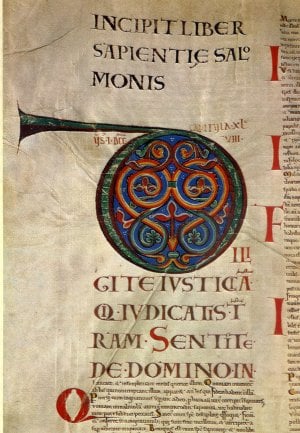 Oh, things were so confusing in the earliest days of Christianity!
Oh, things were so confusing in the earliest days of Christianity!
St. Irenaeus—the second-century bishop of Lyons, France, whose feastday we celebrate on June 28—had to explain and defend the Faith both from within the Church and from outside critics.
As a young boy, Irenaeus was dedicated by his mother to the service of the Church; and he was placed in the care of Polycarp, a bishop and apologist who had learned the faith directly from St. John the Evangelist. From Polycarp, he attained a good education in the Catholic Faith.
And what were the burning issues which divided followers of Christ, and which Irenaeus helped to clarify?
- Canon of Scripture – For one thing, the canon of scripture had not yet been firmly set; some (such as the heretic Marcion) believed that only the writings of Paul and the Gospel of Luke could be trusted, while denying the inspiration of the other gospels. No, said Irenaeus—all four of the canonical gospels (Matthew, Mark, Luke and John) were divinely inspired; while each tells us something different about the life of Christ and about the faith, all should be read with reverence and with faith. Because of his clear teaching on this, Irenaeus became known as the defender of the four-fold Gospel.
- Dating of Easter – It’s difficult to understand how this simple issue could have so divided the Church as to threaten schism. That’s what happened, though! The Church of Rome, following tradition established by Peter, always celebrated Easter on a Sunday. The Eastern churches, however, celebrated according to the date of the Passover on the Jewish calendar. Irenaeus respected apostolic diversity, and persuaded the Pope not to excommunicate the leaders of the churches in Asia Minor. Rather, he encouraged, the wisdom of each should be respected.
- Strong Defense Against Gnosticism – And Irenaeus is known especially for his clear teaching against the Gnostics, who claimed that that they possessed a secret oral tradition received from Jesus himself. Irenaeus wisely pointed them back to the teaching magisterium—the bishops in different cities, all of whom drew their ordination back to the Apostles. None of the early bishops, Irenaeus pointed out, were gnostics; and the only safe way to protect the Church which Christ founded from heresy was to follow the bishops in interpreting and understanding the Scripture.
Irenaeus remains an inspiration for unity today. He is considered a saint not only by Roman Catholics, but also by the Eastern Orthodox, by the Lutheran Church-Missouri Synod, and by the Episcopal Church in the United States.











